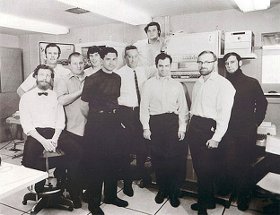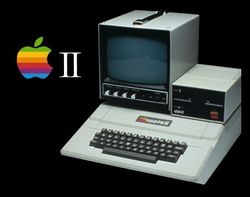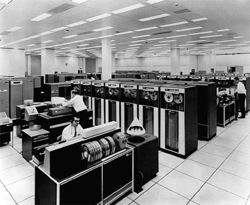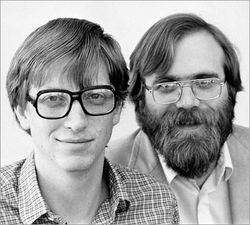Think of this as Volume 14, Number 46 of A-Clue.com, the online newsletter I've written since 1997. Enjoy.

This is especially true for business history. And technology history.
In contemplating a War Against Oil I have emphasized the importance of standards. If I know the marginally-efficient solar panel I buy today can be replaced later, at just the cost of the panel, I am more likely to buy it.
In computing history a lot of the important standards work was led by government.
The Internet was entirely a government project — only after its standards were established was the private sector allowed in. I think it's because there was so much money on the line that private companies just refused to cooperate. They focused on who would pay who and not on how do we move the data. (Picture from the University of Alberta.)
So private sector standards are easier to establish when an industry is new.

Here are some private standards that did stand the test of time. A typewriter for input. A TV for output. Mice. The first two emerged with the Apple II (compare it to the MITS machine) and the third emerged soon after. They're still with us.
All of which leads to a simple suggestion.
Sometime early next year, energy secretary Stephen Chu (below) should convene a summit on green energy standards. Make sure top venture capitalists like Vinod Khosla are on board early-on. I mention Khosla because the Sun co-founder has feet in both India and the U.S.
This needs to be an international conference.

On the second day, you break into working groups where major players in each area can set an agenda for setting standards wherever they can. These might then be passed on to the IEEE for further study and action.
But here's the thing. You keep focusing on it. Having the government call the conference raises its profile. Having the President giving his regular attention to the process heightens its importance. By the end of the year, possibly by the time of the UN General Assembly, the President can show serious progress in making certain investments in energy harvesting are future-proofed.
And if the President can't be bothered the private sector can do this on its own, possibly with Al Gore of Kleiner, Perkins in the chair.
Here is what I know, based on some years of reporting. The solar panels available in 2015 will be very different than those you can buy today. They will be made differently, they will probably be made of different materials, they will be far less expensive, more efficient, more reliable, with a longer working life. But we know what they will probably look like. They will probably be rectangular. And we know what they will connect to. They will connect to an electrical system.
Most of Secretary Chu's work over the last two years has focused on the electrical grid. He has been trying to encourage utilities to invest in smart systems that first, tell people how they can save energy and, second, may let utilities buy as well as sell power from more sources.

It's been like trying to negotiate with IBM over computer standards in 1970. All they could see was the mainframe…maybe the minicomputer. But they were still using punch cards for input and printers for output. So, too, were the minicomputer companies.
It's clear to me that the future energy grid has to be designed by the government, much as the Internet itself was first a government project. That starts with loan guarantees for new high-power lines, which can double the efficiency of our power delivery system at a stroke. But first we need to design a more future-proof system, and use the guarantees only for the construction of that system.
The most important thing we can do, of course, is to make the harvesting of energy, the Economics of Abundance, the War Against Oil, a high priority for the Administration. Shining a brighter light on what is being done in laboratories around the world, giving people a real peek at what 2015 and 2020 might look like, has to be done systematically at the highest levels of our government. If Secretary Chu isn't ready to be a TV star (and I happen to think he is) then find someone with more star power. But this is a show that must be greenlighted.
As soon as the public gets it in its head that we are not going to be wedded to increasingly-scarce resources forever, that an Economics of Abundance is at hand, everything will start to change. Because we'll no longer be fighting a "war" for energy — we'll be waging one by peaceful means. We'll no longer be worrying about how to control scarce resources — we'll be talking about what to do with the excess. And we'll no longer be worrying about the Koch brothers — we will have gone beyond them.
The President can use this for his own political purposes, and I hope he does, because I believe in those principles. But he doesn't have to. This is what is happening, this is where we're going.

Because that's the history we're about to recapitulate.
So who's Jack Kilby now? Who's Robert Noyce?
And for all you younger people out there, which of you is Steve Jobs? Bill Gates? (Here with Paul Allen.)
In 1970 they, and I, were all 15 years old.










Nice fuzzy feelings…
Now to the reality.
“Government subsidies for residential solar photovoltaic (PV) energy systems are ineffective, costly and unfair, new research published by The Australia Institute shows. […] It found that despite costing the government $1.1 billion, it will only reduce Australia’s greenhouse gas emissions by around 0.015 per cent and failed to generate significant domestic economic benefits.”
https://www.tai.org.au/index.php?q=node%2F19&pubid=800&act=display
Painful!
Nice fuzzy feelings…
Now to the reality.
“Government subsidies for residential solar photovoltaic (PV) energy systems are ineffective, costly and unfair, new research published by The Australia Institute shows. […] It found that despite costing the government $1.1 billion, it will only reduce Australia’s greenhouse gas emissions by around 0.015 per cent and failed to generate significant domestic economic benefits.”
https://www.tai.org.au/index.php?q=node%2F19&pubid=800&act=display
Painful!